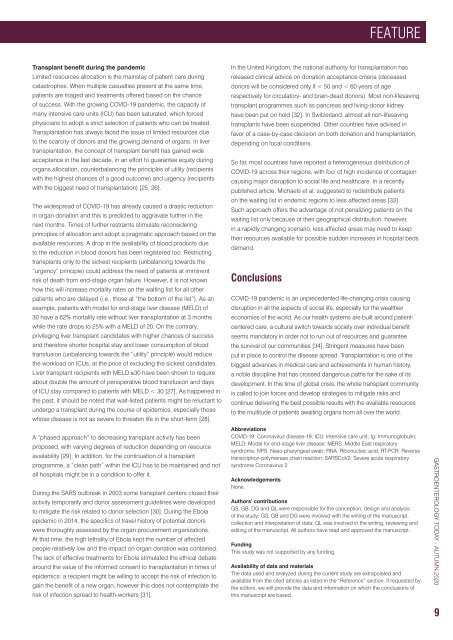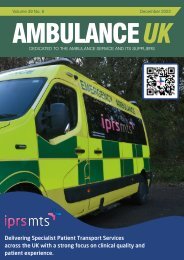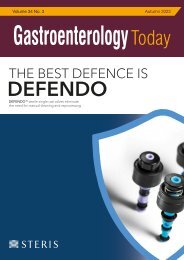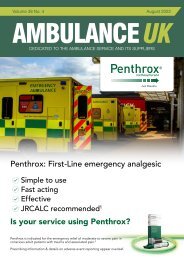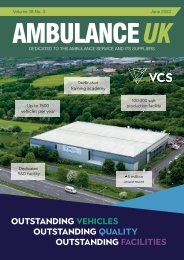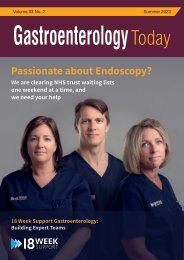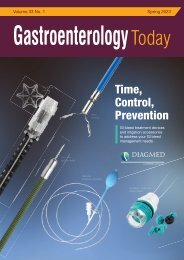Gastroenterology Today Autumn 2020
You also want an ePaper? Increase the reach of your titles
YUMPU automatically turns print PDFs into web optimized ePapers that Google loves.
FEATURE<br />
Transplant benefit during the pandemic<br />
Limited resources allocation is the mainstay of patient care during<br />
catastrophes. When multiple casualties present at the same time,<br />
patients are triaged and treatments offered based on the chance<br />
of success. With the growing COVID-19 pandemic, the capacity of<br />
many intensive care units (ICU) has been saturated, which forced<br />
physicians to adopt a strict selection of patients who can be treated.<br />
Transplantation has always faced the issue of limited resources due<br />
to the scarcity of donors and the growing demand of organs. In liver<br />
transplantation, the concept of transplant benefit has gained wide<br />
acceptance in the last decade, in an effort to guarantee equity during<br />
organs allocation, counterbalancing the principles of utility (recipients<br />
with the highest chances of a good outcome) and urgency (recipients<br />
with the biggest need of transplantation) [25, 26].<br />
The widespread of COVID-19 has already caused a drastic reduction<br />
in organ donation and this is predicted to aggravate further in the<br />
next months. Times of further restraints stimulate reconsidering<br />
principles of allocation and adopt a pragmatic approach based on the<br />
available resources. A drop in the availability of blood products due<br />
to the reduction in blood donors has been registered too. Restricting<br />
transplants only to the sickest recipients (unbalancing towards the<br />
“urgency” principle) could address the need of patients at imminent<br />
risk of death from end-stage organ failure. However, it is not known<br />
how this will increase mortality rates on the waiting list for all other<br />
patients who are delayed (i.e., those at “the bottom of the list”). As an<br />
example, patients with model for end-stage liver disease (MELD) of<br />
30 have a 62% mortality rate without liver transplantation at 3 months<br />
while the rate drops to 25% with a MELD of 20. On the contrary,<br />
privileging liver transplant candidates with higher chances of success<br />
and therefore shorter hospital stay and lower consumption of blood<br />
transfusion (unbalancing towards the “utility” principle) would reduce<br />
the workload on ICUs, at the price of excluding the sickest candidates.<br />
Liver transplant recipients with MELD ≥30 have been shown to require<br />
about double the amount of perioperative blood transfusion and days<br />
of ICU stay compared to patients with MELD < 30 [27]. As happened in<br />
the past, it should be noted that wait-listed patients might be reluctant to<br />
undergo a transplant during the course of epidemics, especially those<br />
whose disease is not as severe to threaten life in the short-term [28].<br />
A “phased approach” to decreasing transplant activity has been<br />
proposed, with varying degrees of reduction depending on resource<br />
availability [29]. In addition, for the continuation of a transplant<br />
programme, a “clean path” within the ICU has to be maintained and not<br />
all hospitals might be in a condition to offer it.<br />
During the SARS outbreak in 2003 some transplant centers closed their<br />
activity temporarily and donor assessment guidelines were developed<br />
to mitigate the risk related to donor selection [30]. During the Ebola<br />
epidemic in 2014, the specifics of travel history of potential donors<br />
were thoroughly assessed by the organ procurement organizations.<br />
At that time, the high lethality of Ebola kept the number of affected<br />
people relatively low and the impact on organ donation was contained.<br />
The lack of effective treatments for Ebola stimulated the ethical debate<br />
around the value of the informed consent to transplantation in times of<br />
epidemics: a recipient might be willing to accept the risk of infection to<br />
gain the benefit of a new organ, however this does not contemplate the<br />
risk of infection spread to health-workers [31].<br />
In the United Kingdom, the national authority for transplantation has<br />
released clinical advice on donation acceptance criteria (deceased<br />
donors will be considered only if < 50 and < 60 years of age<br />
respectively for circulatory- and brain-dead donors). Most non-lifesaving<br />
transplant programmes such as pancreas and living-donor kidney<br />
have been put on hold [32]. In Switzerland, almost all non-lifesaving<br />
transplants have been suspended. Other countries have advised in<br />
favor of a case-by-case decision on both donation and transplantation,<br />
depending on local conditions.<br />
So far, most countries have reported a heterogeneous distribution of<br />
COVID-19 across their regions, with foci of high incidence of contagion<br />
causing major disruption to social life and healthcare. In a recently<br />
published article, Michaels et al. suggested to redistribute patients<br />
on the waiting list in endemic regions to less affected areas [33].<br />
Such approach offers the advantage of not penalizing patients on the<br />
waiting list only because of their geographical distribution, however,<br />
in a rapidly changing scenario, less affected areas may need to keep<br />
their resources available for possible sudden increases in hospital beds<br />
demand.<br />
Conclusions<br />
COVID-19 pandemic is an unprecedented life-changing crisis causing<br />
disruption in all the aspects of social life, especially for the wealthier<br />
economies of the world. As our health systems are built around patientcentered<br />
care, a cultural switch towards society over individual benefit<br />
seems mandatory in order not to run out of resources and guarantee<br />
the survival of our communities [34]. Stringent measures have been<br />
put in place to control the disease spread. Transplantation is one of the<br />
biggest advances in medical care and achievements in human history,<br />
a noble discipline that has crossed dangerous paths for the sake of its<br />
development. In this time of global crisis, the whole transplant community<br />
is called to join forces and develop strategies to mitigate risks and<br />
continue delivering the best possible results with the available resources<br />
to the multitude of patients awaiting organs from all over the world.<br />
Abbreviations<br />
COVID-19: Coronavirus disease-19; ICU: Intensive care unit; Ig: Immunoglobulin;<br />
MELD: Model for end-stage liver disease; MERS: Middle East respiratory<br />
syndrome; NPS: Naso-pharyngeal swab; RNA: Ribonucleic acid; RT-PCR: Reverse<br />
transcription-polymerase chain reaction; SARSCoV2: Severe acute respiratory<br />
syndrome Coronavirus 2<br />
Acknowledgements<br />
None.<br />
Authors’ contributions<br />
GS, GB, DG and QL were responsible for the conception, design and analysis<br />
of the study; GS, GB and DG were involved with the writing of the manuscript,<br />
collection and interpretation of data; QL was involved in the writing, reviewing and<br />
editing of the manuscript. All authors have read and approved the manuscript.<br />
Funding<br />
This study was not supported by any funding.<br />
Availability of data and materials<br />
The data used and analyzed during the current study are extrapolated and<br />
available from the cited articles as listed in the “Reference” section. If requested by<br />
the editors, we will provide the data and information on which the conclusions of<br />
this manuscript are based.<br />
GASTROENTEROLOGY TODAY - AUTUMN <strong>2020</strong><br />
9


